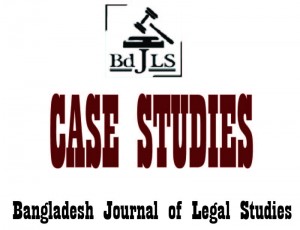Citation: 5 U.S. 137 (1803)
Facts of the case:
Thomas Jefferson was voted as the 3rd president of USA in November 1800 but would not assume office until March, 1801. This enabled president Adams to appoint new govt. officials before the new president take office. Jefferson was a Democrat-Republican but Adams was a Federalist. So the ‘Lame Duck’ congress took the opportunity to pass the Judiciary Act of 1801. These ensured additional federalists would be in powerful positions in the new govt. According to the plan Adams appointed 16 Federalist circuit judges & 42 Federalist judges who were all called as ‘Midnight Judges’ (i.e., the last minute appointment). One of them was Willium Marbury who was named as Justice of Peace for the district of Columbia. When Thomas Jefferson started office, his Secretary of State, James Madison, did not deliver the official paper works to the ‘Midnight Judges’. Thus, they, including Marbury, were denied their new jobs. As a result, Marbury petitioned for a writ of mandamus to force Madison to deliver the commission.
Issues:
Meanwhile, Chief Justice John Marshall denied the petition and refused to issue the writ of mandamus even though section 13 of the Judiciary Act of 1789 gave the Supreme Court authority for such writs to be issued. But in the Article 3 of the USA Constitution, the power to force actions of the govt. officials is not recognized. Therefore, the following questions arose (1) whether or not the petitioner has a right to the commission he demands? (2) if he has a right, which is violated, do the laws of the country afford him a remedy? and (3) whether or not Section 13 of the Judiciary Act was in violation of the Constitution?
Case History:
As per section 13 of the Judiciary Act of 1789, this case reached the U.S. Supreme Court straightaway. The proceedings of the case indicated a conflict between sec. 13 & the article 3 of the Constitution. So, depending on the decision of the Chief Justice a significant change was bound to follow.
Decision:
The Chief Justice found that the petitioners were entitled to their commissions but the Constitution did not give power to the Supreme Court to issue writs of mandamus even though section 13 did. It was inconsistent with the Constitution and therefore it was invalid. As the Constitution is superior to any ordinary Act of the legislature, a Court may declare an Act of Congress void if it is inconsistent with it. The Constitution placed the entire confidence upon the supreme executive regarding delivering and withholding a commission as a political act for any misconduct, respecting which, the injured individual (Marbury) has no remedy.
Result of the case:
John Marshall’s decision was influenced by Dr. Bonham’s Case also known as Thomas Bonham v College of Physicians. This case was decided in 1610 by the Court of Common Pleas in England under Sir Edward Coke, almost two hundred years before the American case Marbury v Madison. Coke said that, “in many cases, the common law will control Acts of Parliament”. According to one interpretation, Coke intended, here, the kind of judicial review that would later develop in the US. In the decision of Marbury V Madison case, we certainly see that. The decision increased the Court’s power by encouraging the judicial department to say what the law actually is. So from this, a court may now declare an Act of the Congress void if it found prove that the Act was inconsistent with the Constitution. Like many rules and Acts of British, Bangladesh has also obtained this view and it is being reflected in the Constitution of Bangladesh. Article 7 of it established supremacy of the Constitution by saying if any other law is inconsistent with this Constitution that law shall, to the extent of the inconsistency, be void. This clearly is similar to the decision of John Marshall and intended the kind of judicial review that had developed in the US. Article 105 gave the Appellate Division power to review judgments or orders made by it subject to the provisions of any Act of Parliament and of any rules made by that division. Again there exists article 47 according to which no law shall be deemed to be void on the ground of inconsistency with the Constitution if Parliament expressly declares that such provisions have been made to give effect to any of the fundamental principles of state policy. Hence, this is a hindrance to the judicial review system of Bangladesh as many inconsistent and harmful Acts can be passed through it.

I love love love love this
I have a presentation and this is really helping me
It’s brief and consise
Many Many Thank’s
(Law Student of People’s University of Bangladesh, Dhaka)